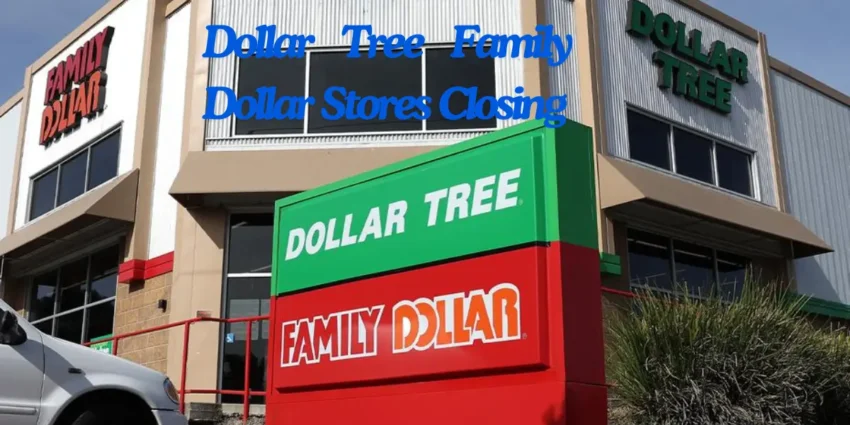In recent times, the retail landscape has been undergoing significant changes, with major stores like Dollar Tree and Family Dollar announcing closures across various locations. The Dollar Tree Family Dollar stores closing is a trend that has caught the attention of many shoppers who rely on these stores for affordable options. However, their recent decisions to close certain outlets have raised concerns among customers and communities. In this comprehensive article, we delve into the reasons behind these closures, the impact on consumers, and what the future holds for these beloved stores.
Reasons Behind the Store Closures
Economic Pressures and Shifting Consumer Behavior
The retail industry has been facing economic pressures, driven by factors such as rising costs, supply chain disruptions, and changes in consumer spending habits. The Dollar Tree family dollar stores phenomenon reflects broader issues within the retail sector. As inflation rises, the cost of goods has increased, squeezing profit margins for retailers. Additionally, the shift towards online shopping and the convenience it offers has affected foot traffic in physical stores, contributing to the Dollar Tree family dollar stores closing trend.
Overexpansion and Cannibalization
Dollar Tree and Family Dollar have experienced rapid expansion over the past decade, opening numerous new locations across the country. While this growth strategy initially aimed to capture a larger market share, it has led to overexpansion in certain areas. In some cases, the proximity of multiple store locations has resulted in cannibalization, where stores compete with each other for the same customer base. This has diluted profits and forced the companies to reassess their store portfolios, resulting in Dollar Tree Family dollar stores in various regions.
Operational Challenges and Store Performance
Not all stores perform equally, and this is true for Dollar Tree and Family Dollar as well. Some locations have struggled with declining sales and lower profitability. These underperforming stores often become a financial burden on the company, prompting the decision to close them. The Dollar Tree Family Dollar Stores decision is influenced by the need to focus on more profitable locations and optimize their store network. This strategic move aims to enhance their overall financial health.
Impact on Consumers and Communities
Accessibility to Affordable Goods
For many shoppers, Dollar Tree and Family Dollar stores provide access to affordable everyday essentials, household items, and seasonal products. The closure of these stores can create a void in communities, particularly in low-income areas where access to affordable goods is crucial. The Dollar Tree Family Dollar stores closing can lead to increased financial strain on families who rely on these stores for budget-friendly options.
Job Losses and Economic Consequences
The closure of Dollar Tree and Family Dollar stores also has a direct impact on employment. Each store employs several staff members, including cashiers, stock clerks, and managers. The Dollar Tree Family Dollar stores closing results in job losses, affecting the livelihoods of employees and their families. Moreover, the economic ripple effect can extend to local suppliers and service providers who do business with these stores.
Changes in Shopping Patterns
As Dollar Tree Family Dollar stores closing continues, shoppers may need to alter their shopping patterns. This could involve traveling to farther locations, switching to alternative retailers, or increasing their reliance on online shopping. These changes may lead to added inconvenience and costs for consumers, particularly in regions where dollar stores are the primary source of affordable goods.
What the Future Holds
Strategic Restructuring and Adaptation
Despite the Dollar Tree Family Dollar stores closing, these brands are not disappearing from the retail scene. Instead, they are undergoing a strategic restructuring to better align with market demands and consumer preferences. This includes remodeling existing stores, enhancing product assortments, and investing in e-commerce capabilities. By focusing on stores with strong performance potential, the companies aim to strengthen their market position and continue serving their customers effectively.
Emphasis on Value and Convenience
Both Dollar Tree and Family Dollar have built their brand identities around offering value and convenience. As they navigate these challenging times, they remain committed to providing affordable options to their customers. This includes maintaining a diverse range of products at competitive prices. Additionally, they are exploring ways to enhance the shopping experience, such as introducing more fresh and frozen food items, expanding digital offerings, and improving store layouts. The Dollar Tree Family Dollar stores closing catalyzes these improvements.
Community Engagement and Corporate Responsibility
As key players in the retail industry, Dollar Tree and Family Dollar recognize their role in the communities they serve. They are actively engaging with local communities to understand their needs and concerns. This includes working with community organizations, participating in charitable initiatives, and exploring ways to support local economies. By fostering positive relationships with customers and communities, the companies aim to build trust and loyalty, even as Dollar Tree family dollar stores closing reshapes the retail landscape.
Conclusion
The Dollar Tree Family Dollar stores closing marks a significant shift in the retail landscape. While these closures may present challenges for consumers and communities, they also offer an opportunity for the companies to reevaluate and adapt their strategies. As they focus on strengthening their core business and enhancing customer experiences, Dollar Tree and Family Dollar are poised to navigate the evolving retail environment.
Read our more Blogs…
